Text: Seb Carayol / Photos Courtesy of Nick Manasseh
Every Saturday night from 1987 to 1999, London’s roots fans would tune into Kiss FM pirate radio for a weekly show by the Manasseh crew, which went deep into the early hours of Sunday morning. When the legendary station celebrated its 25th anniversary in 2010, Seb Carayol spoke with the main characters behind Manasseh’s show to look back on their musical saga.
“This is Manasseh, playing rough and hard riddim, on Kiss 100.” From 1987 to 1999, this jingle, courtesy of singer Martin Campbell, would kick-start Manasseh on Kiss FM, the most famous London radio marathon for all lovers of roots, dub, and what history and eBay would name, for lack of a better alternative, “Shaka killers.”
From 2am to 7am every Saturday, Nick Manasseh, Billy T, and Eddie Manasseh’s show did a lot more than simply play out the best of heavyweight reggae: it helped build up and strengthen a whole music scene, and the show’s unofficial cassette recordings are still swapping hands to this day. At a rough estimate, the 12 years Manasseh spent on the radio equate to over 3,000 hours of musical excellence.
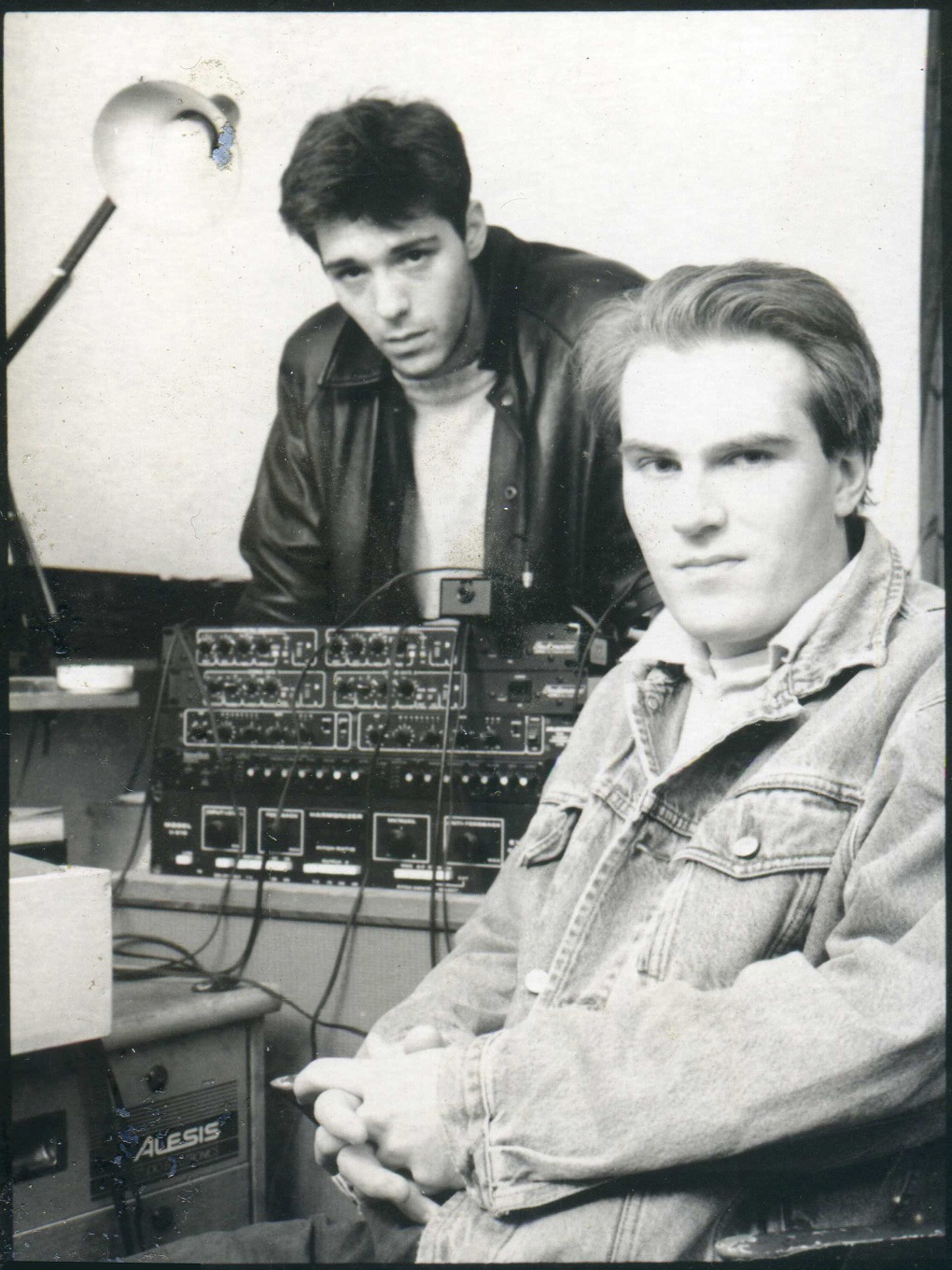
Nick Manasseh and Billy T
Manasseh on Kiss FM is also legendary as the show’s journey is symbolic of England’s pirate radio station history. This underground media was, and still is, an institution and the lifeblood of many music scenes. Before becoming a legal radio station in 1989, Kiss FM was a pirate broadcasting from shaky transmitters made out of tin boxes, and playing cat and mouse with a government particularly repressive on the issue. To this day the government still insists, through the state agency Ofcom, that the hunt for pirates is necessary as they are “a public health hazard.”
Operator of a sound system founded in 1985 who could clash Jah Shaka and Coxsone without being put to shame, Nick “Manasseh” Raphael was already respected by fans of heavy dub when he was offered the opportunity to have a real show every week on the newly set-up Kiss FM in 1987, upon his return from Jamaica. “Everything happened through DJ Norman Jay,” explains one of the four co-founders of Kiss FM, Gordon Mac. “I knew him because he had a sound called Great Tribulation with his brother Joey – which then became Good Times – and they would share the responsibilities: Norman would play soul/funk and Joey would play reggae. I was also DJing at a time, we would still play a bit of everything: some soul, boogie, reggae, lovers rock. That’s how I met them, and I knew they were serious DJs. Norman, who was really taking off at that point, didn’t have much time but he asked if there was space for a reggae show that his brother could run, and I immediately said yes. At that time, there were only three radio stations in London and few gave much time to reggae: David Rodigan had a three-hour slot on Capitol, Ranking Miss P had something on the BBC, and Tony Williams was on Radio London. But there was something missing. Something that was really in the spirit of the blues dances that would take place on a Saturday evening and play until the early hours of the morning. That’s what I wanted to replicate.”
Clearly not enthusiastic at the thought of sacrificing all of his Saturday evenings, Joey Jay fell back on a couple of hours on Sundays, leaving the dirty work to a friend he knew from playing warehouse parties, and who had the passion and crates full of records: Nick Manasseh.
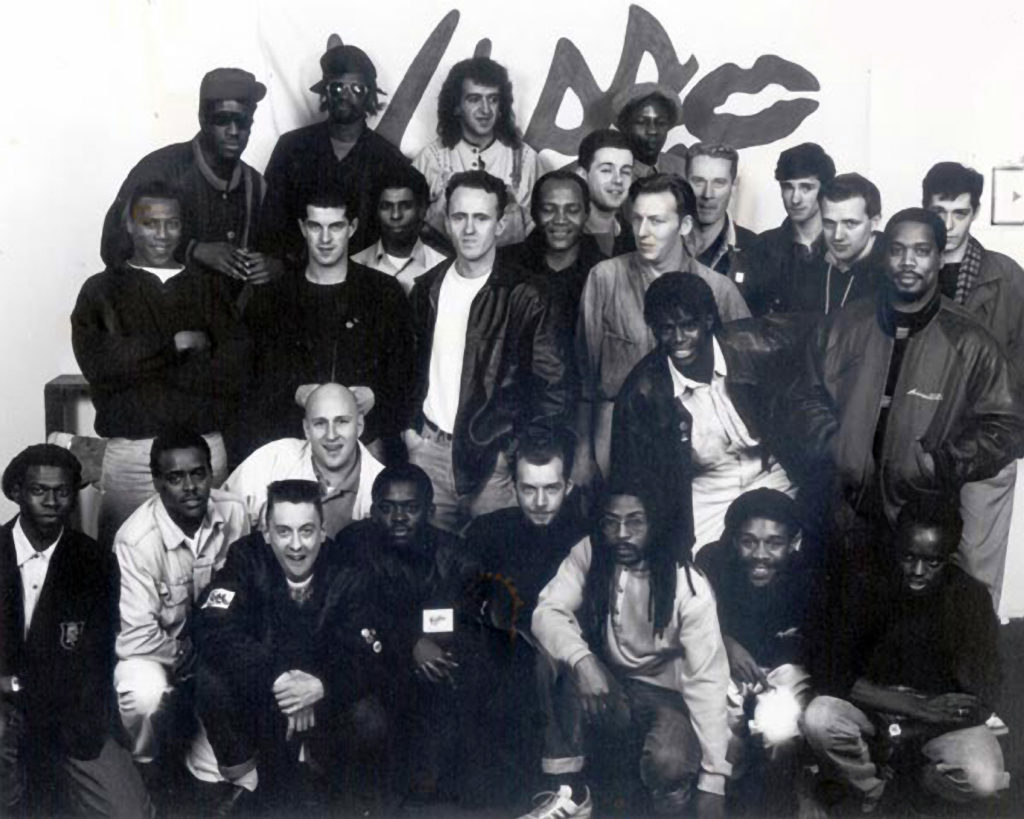
The Kiss FM team circa 1988
Nick accepted the offer and launched his first show, using the famed Martin Campbell jingle. “His associate Jah Rej had sent me a whole cassette’s worth but that was the only one we ended up using,” Nick says with a smile. He was being paid £40 per show and he had no idea he would go down in history alongside Kiss FM, London’s most listened to pirate station, with recordings of his weekly sessions heard around the world for years to come.
At the time “no one was interested in oldies,” says Nick. And so he and his acolytes would take care in selecting the best of the best and also arrange themed nights: a special on Lee Perry, one on Dennis Brown dubplates, and of course the now famous annual “dubplate special,” dedicated to obscure and unreleased tunes especially “Zulu, dub version of Desi Roots” like “He Ain’t Coming Home” or “Travelling” by Poet Armageddon, in between a heap of Gussie Clarke productions.
All of it was done in a cozy atmosphere, and for a time in a small apartment repurposed by Nick. “I got to stay there for a year, I got the keys through my girlfriend’s brother who had this Council Flat and had forgotten to give them back when he left,” recalls Nick. “We lived and broadcasted there: we only needed two turntables, a shoddy transmitter, and two cassette players for the ads and jingles. Just before that, we lived in the attic of a repossessed villa, and the new neighbour Richard Branson (CEO of Virgin) used to come and party with us. That’s how he ended up buying a 15% stake in Kiss when it became legal.” He would not be the only surprise guest. Occasionally Sandeeno or Russ Disciples would appear on the show, as would Mr Scruff, who made up the band Sound Iration with Nick. Not to forget guest Penny Reel [deceased in 2018] and his mind blowing selection of 12 Tribes tunes, or various other Manasseh Sound System affiliates.
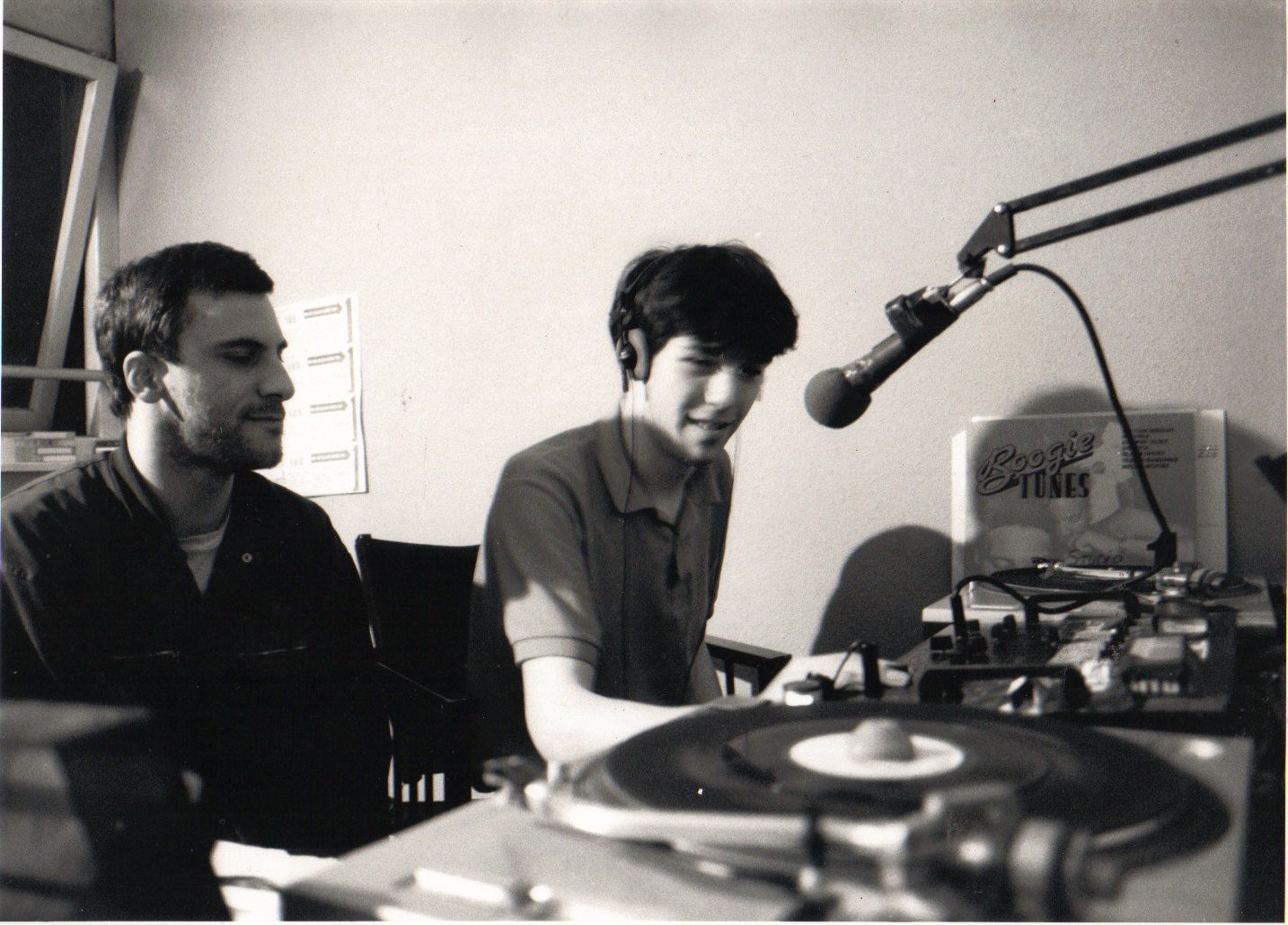
Manasseh and Mr Scruff in Studio
After three years of pirate life, Kiss finally decided to come out into the open. In exchange for promising not to broadcast illegally, the government offered the radio an official frequency in 1989. All that remained was for Gordon Mac to gather £3.5 million, which he managed to find by the end of the year. During these difficult months, Nick wasn’t resting: his dub productions with Sound Iration (along with the vocal cuts, such as “Jah Equity” or “Can’t Touch Jah” with Tena Stelin) followed their first album Seventh Seal, which set the template for the UK Stepper genre. These tracks would be played relentlessly by Jah Shaka and many others. “That success was the beginning of a conflict of interest on my part,” he notes. “With Kiss’ massive audience, I had an unfair advantage compared to other producers, so I never played my productions as much as some would have deserved, like when “Natural Roots” by Earl 16 became my biggest hit.”
And he isn’t the only one of the team to have had some second thoughts. A few months after becoming a legal station, Eddie, as an act of defiance, left the radio as he could not bear the restrictions that legal broadcasting required. “We had to police our broadcasting a lot more,” concedes Nick. “Not necessarily regarding what we were playing, but we now had to drop the levels to zero when we would turn a record over to play the dub, so that listeners didn’t hear the sound of the needle hitting the grooves.” Yet it still remained quite informal: he admits to having fallen asleep during a broadcast more than once, building up the suspense, but mostly leaving a huge silence.
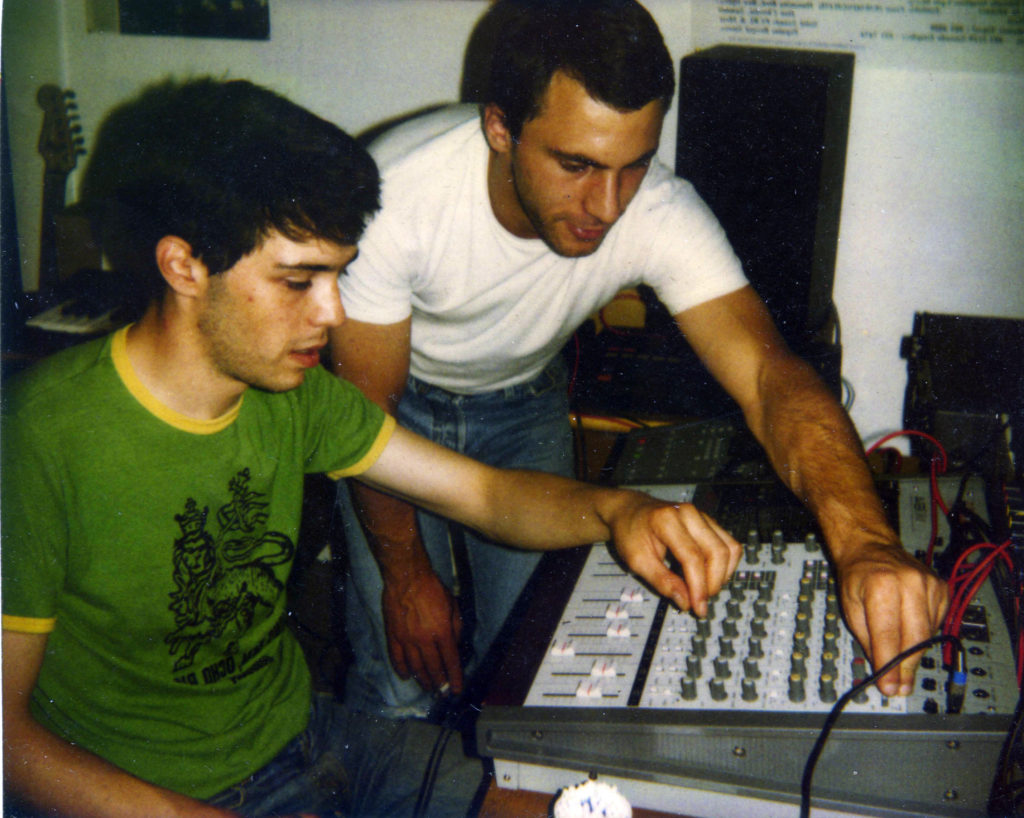
Nick Manasseh and Mr Scruff at the Control
Listeners did not seem to hold these few lapses against him, as they would call Kiss every Saturday night to ask for shout-outs or just to have a chat. Nick kept involuntary souvenirs of these requests, as he had to write them down on the only pieces of papers at hand in the spur of the moment–his record sleeves: “For such and such from Hackney, For so and so from Peckham,” he reads out. During that time, the following show – run by Joey Jay – was short lived but just as popular with fans of Shaka’s style. Shaka even ended up playing a few memorable sets as a guest of honor to an often-mesmerized Joey: somewhere lies a tape of the soundman trying to have everyone guess who the singer was on a specific pre-released he got his hands on, which turned out to be digikiller tune Sidney Mankind’s “These Three Girls.” Despite his reputation for being usually overly protective with his selection, Shaka as a Kiss FM guest was always a fair sport about the whole ordeal, playing some of the best cuts from his upcoming releases or his collection, all of which were interlaced with a soft voice filled with prophetic weight: “when the seventh trumpet will blow, it will be repatriation.”
Those words did not fall on deaf ears. Joey Jay ended up moving to Ghana to start several charities supporting repatriates and people hardly heard from him again, even his brother Norman, now an internationally known DJ, who rarely managed to speak to him [Joey returned to London in 2017 and opened a record booth in town]. Nick ended up throwing in the towel around 1996, having decided to focus solely on music production, aside from occasionally sitting in on a radio show when he feels like it. And Gordon Mac, the pirate captain? He has remained dedicated since his departure from Kiss in 1998; his latest project is Mi-Soul Radio, ‘devoted to soulful music lovers worldwide.’ This time without a sword at his hip or a skull flag at his mast.
To catch a glimpse of the Manasseh Show on Kiss FM, the great site Cry Tough maintains a hefty downloadable archive of cassette rips right here: http://www.crytough.com/manasseh.html
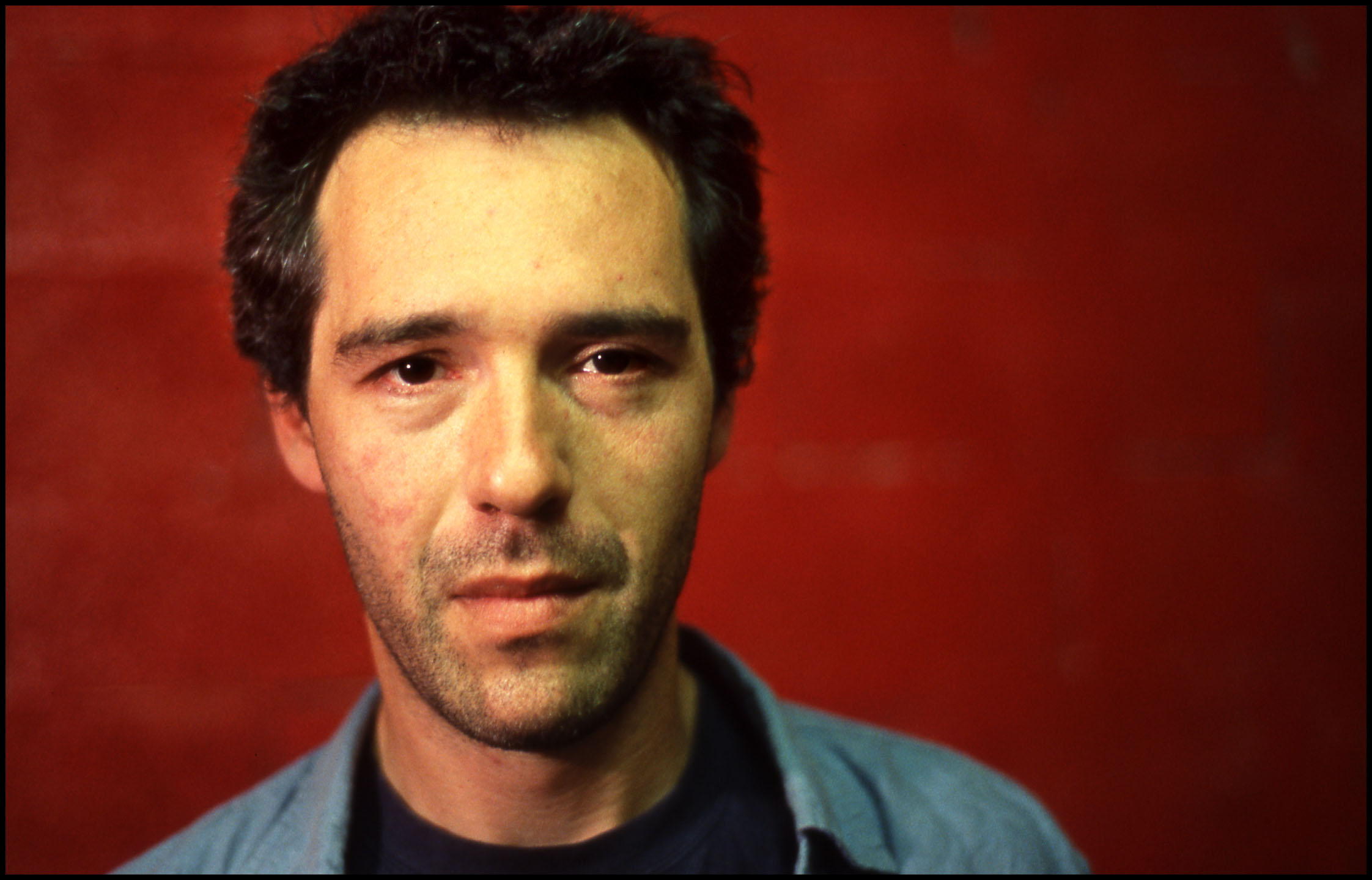
Nick Manasseh in 2010
